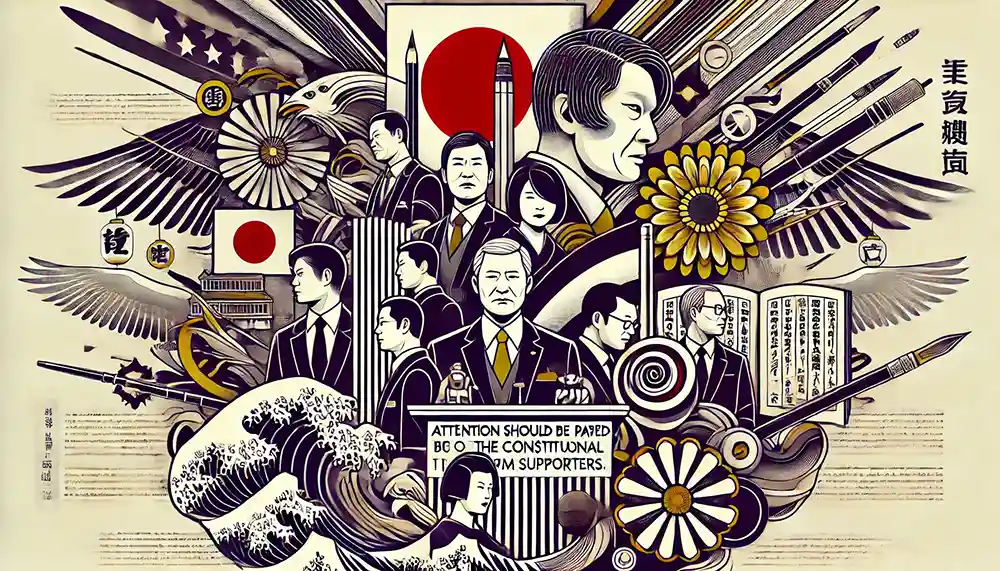
author: Osamu Ajioka
- 1 Changes Among Pro-Amendment Factions - The Background to Watch
- 2 Conservative Politics Unable to Propose a Clear New Political Vision
- 3 Constitutional Amendment as an Alternative to Governance Vision
- 4 Abe's Politics Aimed at Transforming Constitutional Politics While Maintaining Backdoor Politics
- 5 From Discussion to Authority, From Democracy to Majority Rule
- 6 Immediate Challenges of Party Politics
- 7 In Conclusion
Changes Among Pro-Amendment Factions – The Background to Watch
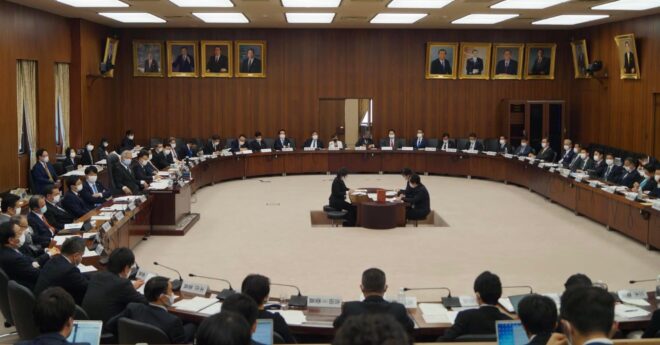
The Asahi Shimbun dated June 4 reported that there is a movement to submit the constitutional amendment draft only by the pro-amendment factions in the current Diet. According to this article, the submission methods for the amendment proposal are: (1) The chair of the Constitutional Review Committee will do so with the agreement of each party, and (2) it is conceivable that it will be done with the support of more than 100 members in the House of Representatives and more than 50 members in the House of Councillors.
Currently, the Constitutional Review Committee is facing opposition from the Constitutional Democratic Party and the Communist Party, which has hindered progress in creating a constitutional amendment draft. However, it appears that there is a movement to create an amendment draft solely by the pro-amendment factions and submit it to the Diet. This sentiment exists within the Liberal Democratic Party (LDP), which is considering the five factions of the LDP, Komeito, Nippon Ishin no Kai (Japan Innovation Party), the Democratic Party for the People, and the independent faction in the House of Representatives known as the “Group of Friends.”
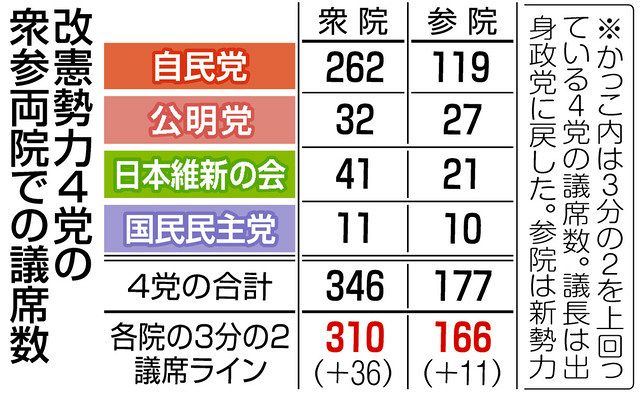
In short, they intend to create a proposed amendment solely with the supporting factions and present it to the National Diet. Furthermore, the June 6th Asahi Shimbun reported that within the Liberal Democratic Party’s constitutional amendment headquarters, there have been cautious discussions regarding a forceful push (for drafting provisions) solely by the pro-amendment factions. It was also reported that no conclusions have been reached about future directions. Additionally, the LDP has decided to aim for consensus among all factions, but in any case, the movements within the Constitutional Review Committee should be closely monitored.
The Constitutional Review Committee has valued the consensus of each faction, but by breaking this custom and proceeding with the agreement of only a part of the factions, there is a movement to change the existing methods (procedures) of constitutional amendment. The establishment of the constitution is said to be the realization of democracy, and this has been reflected in the amendment procedures, with the notion that “democracy is a procedure” symbolizing this idea. Unlike other laws, the amendment of the constitution requires the approval of more than two-thirds of the members of both houses, as well as a national referendum, which are key factors in this process.
In this sense, it has been natural that the drafting of the constitutional amendment provisions has proceeded on the premise of obtaining consensus from each faction. However, there is now a movement to change this, and we must also consider the background behind it.
[Sponsor Ad]
Conservative Politics Unable to Propose a Clear New Political Vision
There are several factors to consider regarding the changes in the movement surrounding constitutional amendment. In broad terms, I think two main points can be highlighted here.
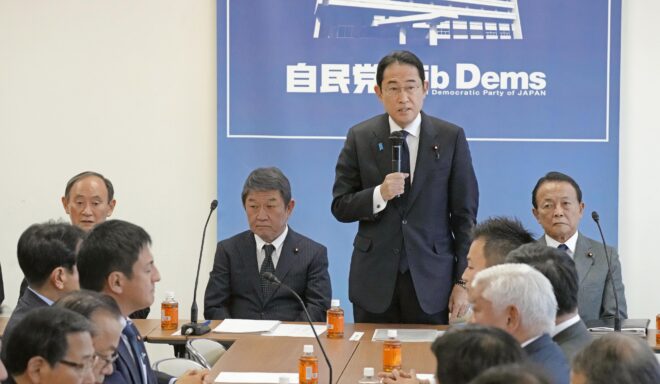
One factor is the current political crisis faced by the Liberal Democratic Party (LDP). Specifically, the LDP is confronting a crisis that originated from the issue of slush funds. The slush fund issue has revealed how the LDP, as a traditional conservative party, has secured its political status (government) through “backdoor politics”. The criticisms stemming from this have manifested as consecutive electoral defeats, and it has become a question of the fate of the LDP president (prime minister). This has emerged as a phenomenon signaling the beginning of a change in government.
The second point, which has become clear because of this, is that the LDP lacks any significant policies or political vision regarding the current situation. The political maneuvers surrounding the hastily introduced and established funding regulation laws regarding the slush fund issue highlight the LDP’s absence of a political policy (political vision). The farce of trying to pass a bill just to say they did, even if it is ridiculed as a “loophole bill,” has exposed their lack of a clear political direction for the future.
This can also be said of the opposition parties. At the very least, they should have clarified the prohibition of donations from corporations and organizations and established accountability for spending. The essence of the slush fund issue is controlling elections with money, so the focus should be on stopping that money and applying strict penalties to the LDP in elections. Such criticism of conservative politics should be demonstrated at the polls. The winds of criticism toward the LDP should continue blowing until there is a change in government.
Constitutional Amendment as an Alternative to Governance Vision
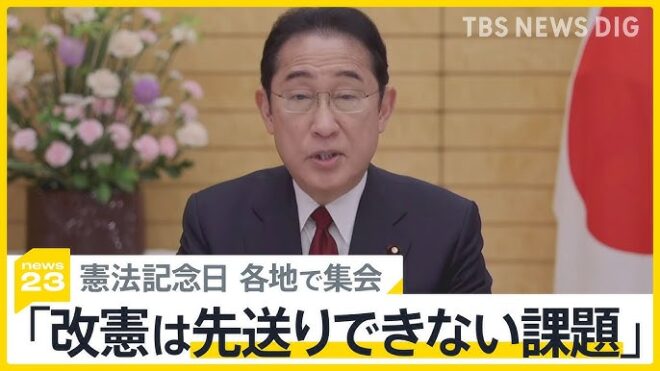
The current Kishida administration is struggling with criticisms regarding the slush fund issue and is trying to respond and navigate through it with a political funding reform bill. They aim to incorporate proposals from Komeito and the Japan Innovation Party to pass this bill and suppress the voices of criticism. However, looking at the recent election trends, it shows that criticisms of the LDP due to the slush fund issue cannot be resolved in such a manner.
This issue has transformed into calls for a change in government that were not anticipated before the slush fund problem was exposed. If the situation continues to progress as it is, it seems that these calls for a change in government will accelerate. The members of the LDP are likely aware that simply amending the Political Funding Law will not resolve the matter. In September, there will be a leadership election for the LDP, and they are strategizing on how to contextualize the slush fund issue in relation to this, in order to maintain their governance. Whether Kishida remains as Prime Minister will likely be related to this strategy.
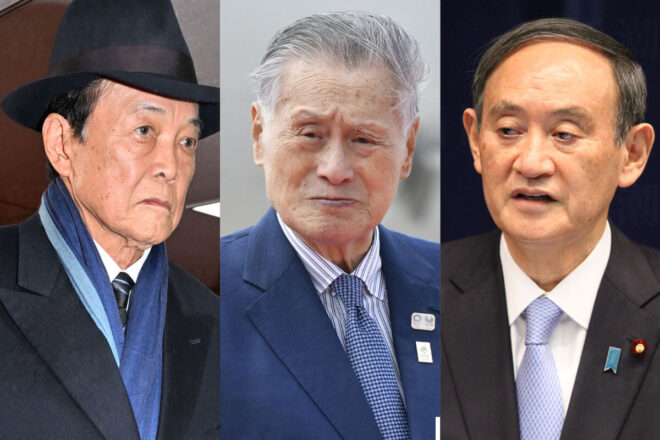
Amidst this, both Komeito and the Japan Innovation Party are cozying up to the LDP with the political funding regulation law, with hopes of participating in the government. It is clear that the LDP will suffer a significant defeat in the elections. This will manifest as a drastic reduction in the number of seats. In such a case, they may face a situation where they can no longer cling to power and will have to step down, or they might maintain their position through a coalition government.
The senior members of the LDP likely see that it is impossible to sustain their government alone and are considering a coalition with Komeito, the Innovation Party, and the Democratic Party for the People. In response to these movements, I believe the Innovation Party prefers participation in the LDP government over a regime change centered around the Constitutional Democratic Party. The Democratic Party for the People is in a more delicate position.

These movements are part of the political parties focused on government power, but the LDP lacks a political policy that integrates the various factions. The current National Diet is set to conclude in June, and it is likely that they aim to pass the political funding regulation amendment in this session, to address the slush fund issue, while awaiting the calming of the situation, and simultaneously devise political strategies including the LDP leadership election. However, I foresee that a suitable strategic plan will not emerge.
Moving forward, the election and the maintenance of power will become central issues for the LDP, but it is unlikely that the necessary political strategies (policies and visions) will emerge. Instead, constitutional amendments, particularly the establishment of an “emergency provisions” clause, may be proposed. In other words, this movement should be seen as a precursor to such trends.
[Sponsor Ad]
Abe’s Politics Aimed at Transforming Constitutional Politics While Maintaining Backdoor Politics
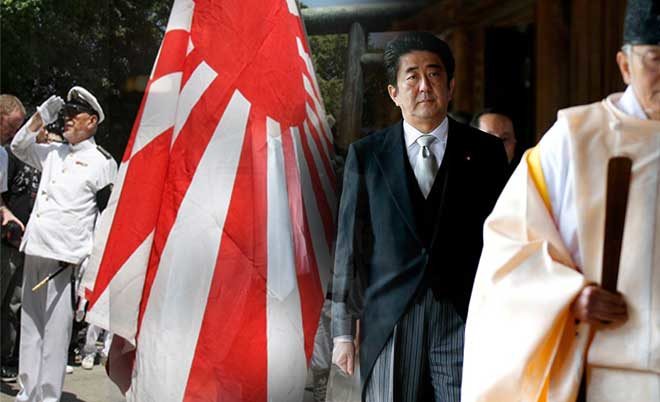
The slush fund issue has emerged as a legacy of Abe’s politics, revealing that the essence of the LDP lies in the power of money to control elections. This issue, along with the problems exemplified by the Unification Church and other interests-driven issues, represents the comprehensive backdoor politics that define the LDP as a conservative party, and this has been its tradition.
Originally, the role of a political party should be the discussion and legislation in the legislative branch; however, under backdoor politics, party members have become overwhelmed with merely becoming legislators, and the role of legislation has instead been undertaken by bureaucrats, whose role should be that of the executive branch. This is evident when observing the role and actions of bureaucrats during questioning and government responses in the National Diet. As a result, Japan’s political parties have the lowest legislative capacity, supplementing that contradiction in relation to bureaucrats. The term bureaucratic dictatorship exists for a reason.
Changing this structure of backdoor politics surrounding the parliament, government, bureaucratic system, and elections is what will change Japanese politics. However, the Democratic Party, which once changed the government, was defeated in its struggle against the bureaucratic system, allowing the backdoor politics of the Abe administration to continue. What was the alteration attempted by Abe’s politics while relying on backdoor politics? It was to transform the constitutional politics that shifted from the emperor system of authoritative politics that had defined post-war politics.
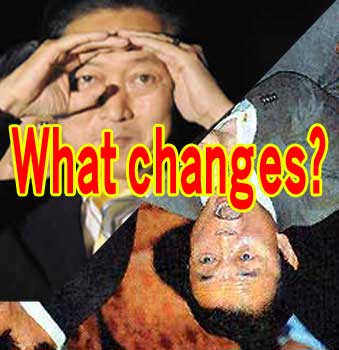
Abe’s words about the “transformation of the post-war system” broadly refer to a shift in post-war politics and an amendment of the post-war constitution. This was also the reason why Abe sought to inherit the political will of his grandfather, Nobusuke Kishi. This constitutional amendment involved a change to Article 9 (renunciation of war) and a transformation of constitutional politics (governance through discussion). It was a change in the constitutional politics that the spirit of the constitution had indicated (i.e., constitutional governance).
In other words, Abe aimed for constitutional amendments while adhering to and relying on the traditional backdoor politics. When we talk about constitutional amendments, we can certainly consider the revision of provisions or the establishment of new ones, but at the same time, it also involves a change in the political structure and political space that the constitution signifies (a change in political style). Thus, while there can be interpretations that change the constitution without amending or creating new provisions, there is also the possibility of fundamentally altering the spirit of the constitution itself.
For example, there is the reinterpretation of collective self-defense, but alongside that, the process could involve changing governance from discussion-based governance to authority-based governance. The Abe administration’s disregard and formalization of “governance through discussion” could be seen as a concrete manifestation of this. The legislative branch (parliament) is considered the center of politics, and it has been emphasized in modern politics because it represented the concrete existence of “governance through discussion.”
The spirit of the constitution is fundamentally about the limitation of power and political participation by the people, along with “governance through discussion”. This is reflected in provisions such as the stipulation of political freedoms, which are embodied in the articles and are present as political practices. However, it cannot be said that the spirit of the constitution has fully realized its expected original power and role, despite its existence as the fundamental law of the constitution. This reflects the current state of modern politics in Japan; nevertheless, it is undoubtedly true that the post-war transformation has advanced towards constitutional politics compared to the imperial governance under the Meiji Constitution.
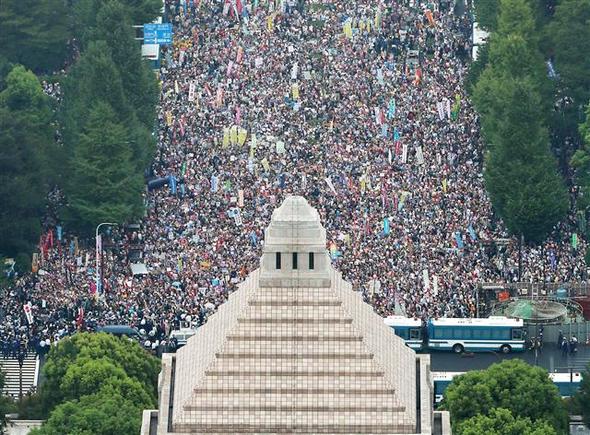
From Discussion to Authority, From Democracy to Majority Rule
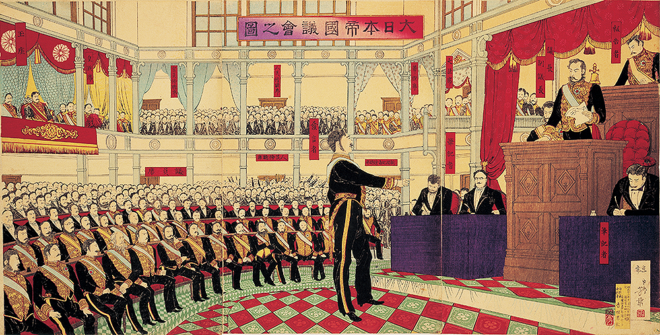
The legislative branch is the place for “governance through discussion,” and it transformed the governance by the emperor (governance by authority). While the bureaucrats of the emperor maintained a significant role in the political space post-war, preventing the legislative branch from fulfilling its original role, it has still been an important political space and has served some functional purposes. Generally referred to as post-war democracy, the form of post-war politics has been inadequate in terms of realizing the constitutional spirit, yet it has certainly advanced relatively compared to the pre-war period. In terms of the realization of the constitutional spirit, it has always been relative, but it has carried some significance.
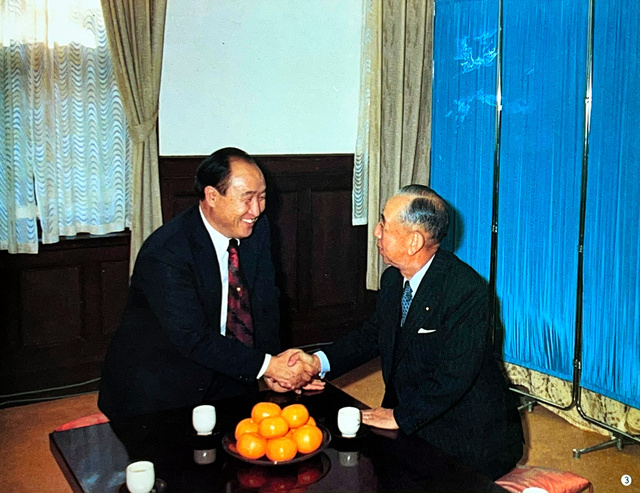
The transformation of the post-war system that Abe advocated was a shift in post-war constitutional politics. It symbolized the abandonment of the renunciation of war as represented by Article 9 of the Constitution and simultaneously reflected the hollowing out of “governance through discussion.” This can be said to have started with his grandfather, Kishi Nobusuke through forced votes, but it was already premised from the start that passing bills through forced votes would hollow out the deliberations in the Diet. Democracy as a procedure has been replaced by the principle of majority rule.
The process of establishing a bill through discussion is related to procedural democracy, and the forcible establishment of laws by power stands in opposition to it. Abe hollowed out the constitutional spirit of “governance through discussion,” which can be said to have been reflected not only in the constitutional interpretations like collective self-defense rights but also in the amendments to the constitution that he advanced. And this Abe administration has been supported by behind-the-scenes politics.
★Reference】Chronology of the 60th Anniversary of the Security Treaty Struggle
Immediate Challenges of Party Politics
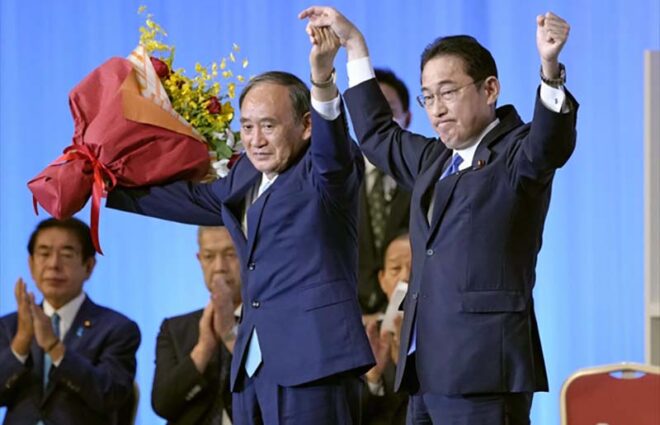
The LDP governments following Abe, represented by Suga and Kishida, have continued the politics of Abe, with behind-the-scenes political maneuvering associated with the Unification Church and the slush fund issue, which has been at the core of post-war conservative politics. In order for conservative politics to change its own political nature (political methods), the LDP must be dismantled and rebuilt. If not, they will cling to power, maintaining the traditional conservative politics, but this will lead to a crisis in elections.
This would mean expanding the framework of the coalition government, which would involve adding not only the Komeito but also the Ishin and the Democratic Party for the People to create a political response. While this may temporarily succeed, it is unlikely to last long. The commonality among the coalition parties in this case will be their opposition to the Constitutional Democratic Party, but the underlying theme is likely to be opposition to the Communist Party. While opposition to the Constitutional Democratic Party can serve as a temporary axis of conflict over power strategy, it cannot become a sustainable one.
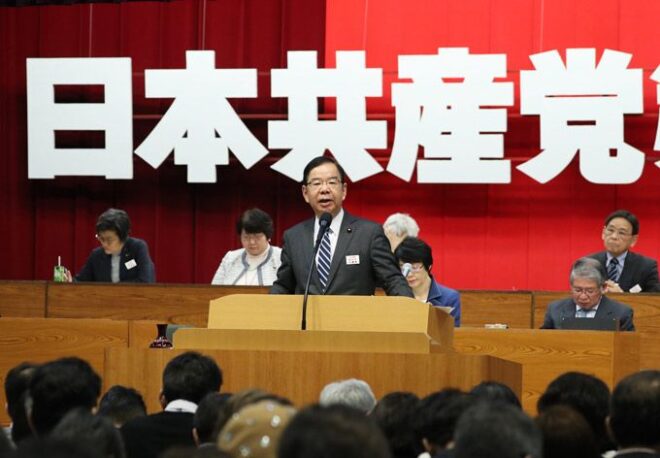
The issue for the Communist Party lies in whether it can clarify its position to move away from its programmatic stance of aiming for a socialist regime (a position seeking to establish political power through proletarian dictatorship) and instead stand on the foundation of constitutional politics (constitutionalism). Sooner or later, the Communist Party will have to change its name and adopt this position if it wishes to remain a significant force.
This relates to the position of the Constitutional Democratic Party as well, but as the Communist Party’s stance becomes clearer, it should strengthen the ability of the opposition to maintain a government. The issues during this process can be clarified through election cooperation and cabinet cooperation. If these points are made clear, the electorate will decide, and the “anti-Communist” sentiment in party politics will become less meaningful.
In Conclusion
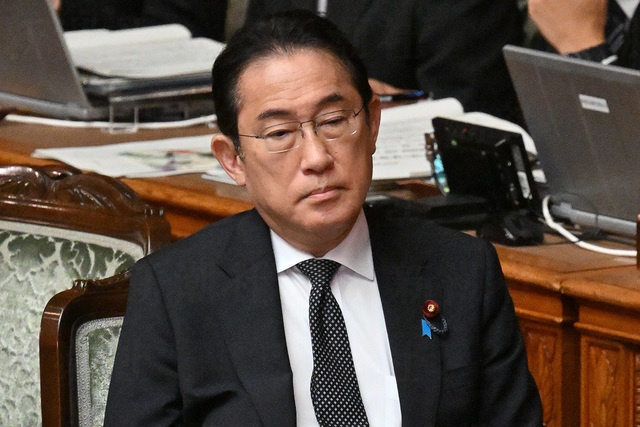
The Kishida administration is described as a “lame duck,” lacking the power to propose any political direction for political survival. However, the thin path of proposing a constitutional amendment seems to remain.
The establishment of an emergency law is likely to be a specific proposal, and this reflects the current situation where “politics by authority” (authoritarian politics) has strengthened through the COVID issue, exacerbated by the wars in Ukraine and Palestine, indicating that “politics by authority” is also spreading in Japan in this manner. Therefore, I hope you will keep an eye on the activities of the Constitutional Review Committee.
author: Osamu Ajioka (Osamu Mikami)
(The headings were added by HataHata)


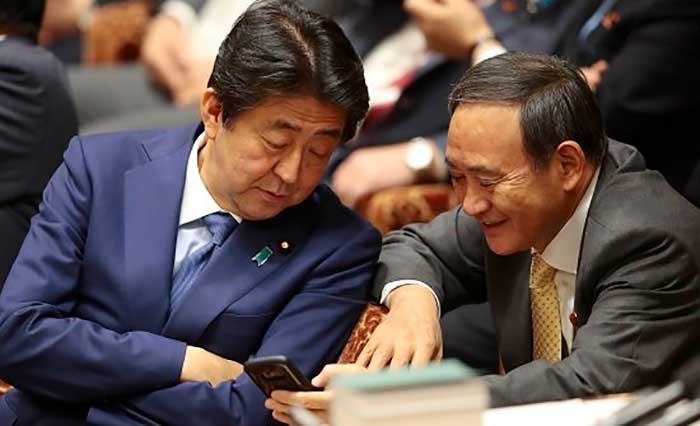



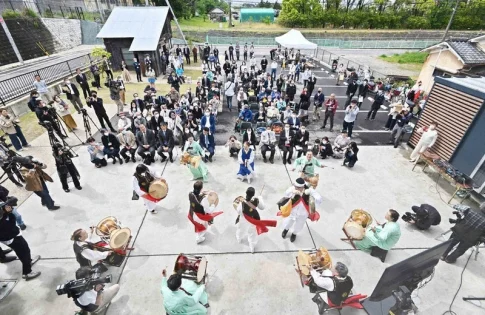

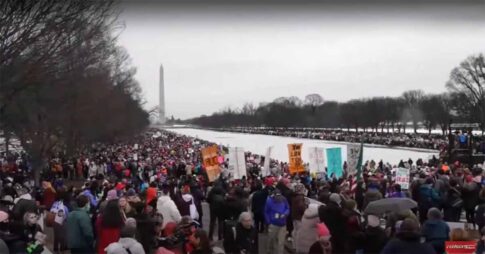



 Donations are made in Japanese yen. 300 yen is approximately 2 USD.
Donations are made in Japanese yen. 300 yen is approximately 2 USD.

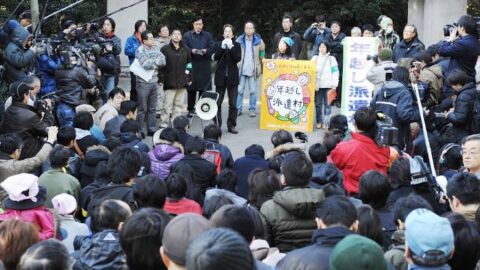



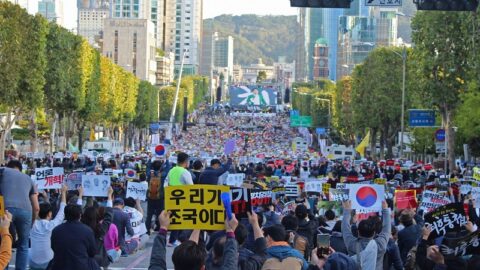






Leave a Reply